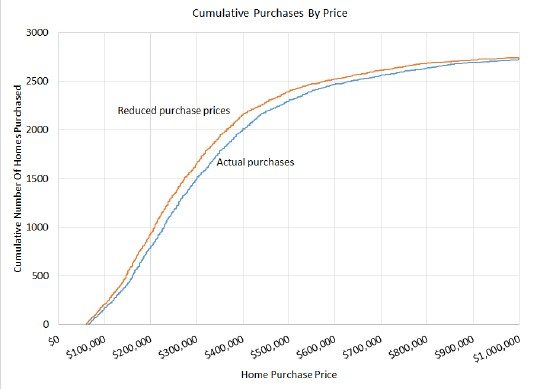A couple of weeks ago I posted on how rapidly mortgage rates have risen since the election. Given the Federal Reserve’s policy direction, this trend is likely to continue. So the obvious question is will higher mortgage rates lead to a crash in the Chicago real estate market? After all, rising mortgage rates result in higher mortgage payments and make homes more expensive to own so home buyers will only be able to buy less expensive homes with higher mortgage rates.
Nevertheless, I don’t believe we have much to worry about.
History Shows Little Impact Of Mortgage Rates On Home Prices
The most compelling argument against a real estate crash from rising mortgage rates is the historical record. Robert Shiller, who is the Shiller in the Case Shiller Home Price Index, has often pointed out that historically there has been little correlation between mortgage rates and home prices. Here is the data that he is using as the basis of that statement. Note that the home price index referenced below is based on real home prices – i.e. home prices with the effects of inflation backed out. Also, because they don’t have mortgage rates going back to the 1800s, they have graphed long term interest rates which correlate closely with mortgage rates.

As you can see in the graph we had some pretty high mortgage rates in the 80s and it didn’t seem to even phase home prices. And in the 20s and 30s and right after the bubble burst falling mortgage rates didn’t seem to boost home prices. However, to the extent that we have high inflation that could simultaneously raise mortgage rates and nominal (with the effects of inflation included) home prices.
Housing Demand That Shifts To Lower Prices Is Replaced By Demand Shifting From Higher Prices
I was thinking about what happens when all home buyers shift their demand down to lower home prices. It seems to me that people looking to buy around $300,000 might start to look for homes priced in the upper 200s but then people looking to buy in the mid 300s might start to look around $300,000, replacing that demand.
To illustrate this point I determined that with a 100 basis point (1%) increase in mortgage rates from current levels people would need to reduce their mortgage amount by 11% in order to keep their monthly payment constant. I then pulled up all the closings above $65,000 (I somewhat arbitrarily assumed that any purchases below this number were too small to get mortgages) in Chicago since October 1 and looked at each purchase and determined what price home these same buyers would have bought if they were faced with 100 basis points higher mortgage costs, needed to keep their monthly payment the same, and applied the same down payment (assumed to be 20% of their actual purchase price) to a lower priced home.
I have to admit that I got quite caught up in my underwear thinking about this but I think I figured it out. The resulting distribution shift is shown in the graph below with the actual cumulative distribution of home purchases in blue and the shifted distribution in orange. In other words for each price it shows how many homes would be purchased at or below that price under the two scenarios.

#Mortgages #MortgageRates
Gary Lucido is the President of Lucid Realty, the Chicago area’s full service discount real estate brokerage. If you want to keep up to date on the Chicago real estate market, get an insider’s view of the seamy underbelly of the real estate industry, or you just think he’s the next Kurt Vonnegut you can Subscribe to Getting Real by Email using the form below. Please be sure to verify your email address when you receive the verification notice.
